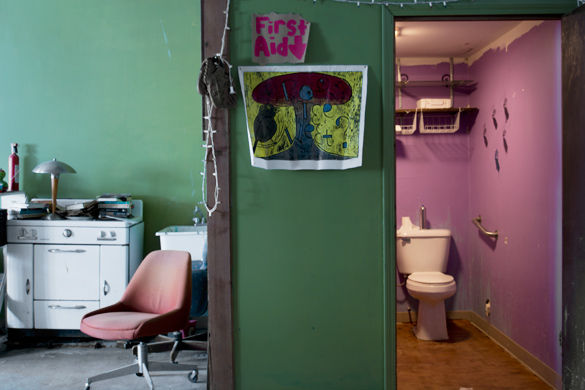Infoshop pushes community progress
February 16, 2015
Ninety percent of American media outlets are controlled by one of six for-profit companies, such as Viacom, Time Warner and Disney, according to Business Insider.
This is one of the many reasons Carbondale community members have chosen to band together and build person-to-person relationships, said Philip Brewer, a doctoral student in philosophy from Augusta, Ga.
Located at 214 N. Washington St., the Carbondale Infoshop is a place to hold free events, organize actions and get alternative perspectives not found in mainstream political discourse, Brewer said.
Advertisement
“The Carbondale Infoshop acts as a community center and hub for localized community progress,” he said.
The Infoshop distributes news in the form of “zines,” which are small booklets of information as well as a radio show on WDBX. Stacks of free posters are a common sight on the shelves inside.
Volunteers have been working to get the space up and running again only this time, independent media distribution is only part of the plan.
Sarah Baumgarten, a workshop volunteer, said they will have a grand re-opening weekend in the spring.
Teach-ins ranging from permaculture lessons on composting and gardening, to yoga and free bike repair are in the works for the spring season.
Baumgarten said the Infoshop aims to bring people together in an effort to build a better community from the bottom up.
Baumgarten, a senior from Chicago studying philosophy, said a lot of progress has been made.
Advertisement*
Besides removing clutter and cleaning, two of the main projects were constructing pallet walls and installing a paper bag floor.
Pallet walls are just like they sound—recycled wood pallets that would have been thrown away—screwed together to build walls.
A paper bag floor is a little more uncommon. Volunteers cut brown paper bags into strips, glued them to the preexisting concrete and applied stain and varnish.
The effect is similar to a hardwood floor, but a fraction of the cost.
“We were searching for awhile for floor ideas,” Baumgarten said. “The paper bag floor came up several times so we decided to try it out, except with our own little twist. Instead of using Elmer’s glue, we used what we had and made it with wheat paste instead.”
Wheat paste is water and flour mixed together and is used in paper mache.
Baumgarten said the six indoor pallet walls cost about $10.
Schnucks and Brent Ritzel, a graduate student and Infoshop volunteer, donated the bags. The only cost associated with the floor was the stain and clear varnish, Baumgarten said.
Both projects took about two workdays to complete. Baumgarten said the location was chosen for the Infoshop because of its low cost and rich history.
Building owner, Eric Deutsch, has let various community organizations use the location for free for more than a decade.
“The last time the space was used was during the Occupy [Wall Street] movement,” Baumgarten said. “It was once home to the Big Muddy Independent Media Center.”
Some volunteers from the Infoshop have taken to the airwaves to spread ideas to the community.
James Anderson, a doctoral candidate in mass communications and media arts from Greenville, participates in a radio show called the Counter-Power Radio Hour on WDBX.
“The Counter-Power Radio Hour is sort of like the on-air space which parallels what the folks are trying to do at the physical space, being the Infoshop,” Anderson said.
The radio show is the first program on 91.1 FM on Sundays from midnight until 2 a.m.
“The Counter-Power Radio Hour is a show that allows for debate, analyses and discussion of counterculture ideas,” Anderson said.
There are other ways the Infoshop differs from most organizations. It has a horizontal power structure, as opposed to a vertical one, Baumgarten said. Meaning there are no bosses or hierarchy.
Sarah Lewison, an associate professor of radio, television and digital media, said infoshops are a concept that has spread worldwide.
“[Infoshops] are associated with people joining together to create other forms of relations to each other along with self-governance… And making their own media and network so that media could be distributed and circulated,” Lewison said.
The Infoshop volunteers also have goals for starting a soil bank and creating a Subsistence Research Center.
Business and community members donate compostable material to the soil bank so nutrient-rich soil is available for those who need it.
Nick Smaligo, a doctoral candidate in philosophy from Carbondale, said “subsistence” does not refer to “barely surviving.” Instead, subsistence relates labor to helping oneself and one another as opposed to making a profit.
“The aim of the Subsistence Research Center is to produce research and collective experimentation into ecologically restorative, regionally self-sufficient and non-monetary economic practices,” Smaligo said.
To volunteer or for more information, contact the Infoshop by emailing theimcinfoshop@gmail.com.
Advertisement









